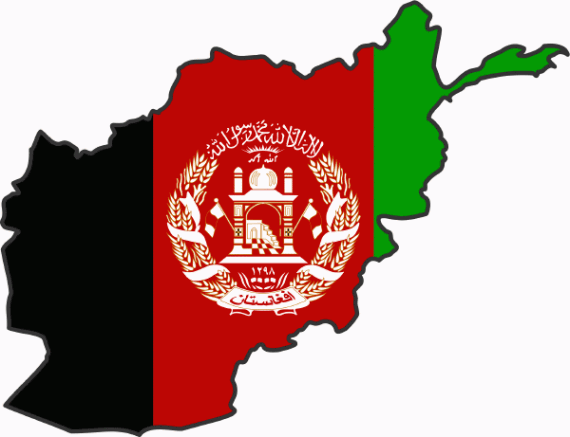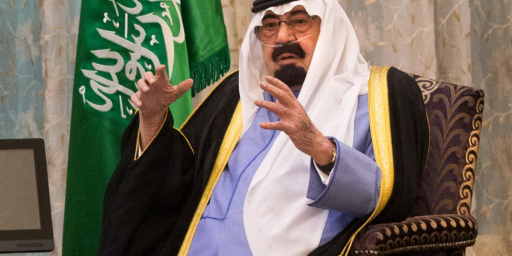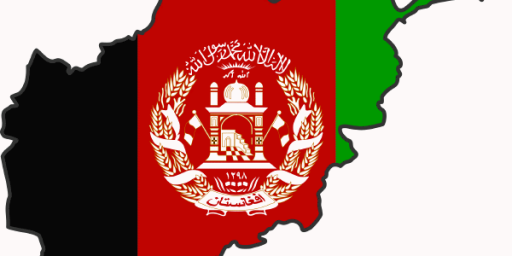Afghans Agree To Changes In Government In Deal To Resolve Election Dispute
The various factions in Afghanistan have agreed, at least in principle, to alter the nation's government as part of a deal to resolve election disputes.
With the outcome of this summer’s Presidential election in Afghanistan threatened to be held in doubt by allegations of fraud. the various factions in the country have agreed to a political deal that alters the nature of the nation’s government to some extent:
KABUL, Afghanistan — The deal that Secretary of State John Kerry brokered to ease the Afghan election crisis with a sweeping audit of the vote was quietly built on an even more profound reshaping of the entire government system, American and Afghan officials confirmed Sunday: The sides have agreed to gradually create an empowered prime minister post after years of an all-encompassing presidency.
Nearly a decade after American officials pushed a Constitution that enshrined near-dictatorial powers for the president, it is a tacit admission that changing to a more parliamentary system — a fraught undertaking at any time — is now seen as crucial to holding the country together after years of mounting political crises and ethnic and factional hostilities, officials said.
The change was a central goal for the candidate Abdullah Abdullah, who has brought the entire political system to the brink with accusations of rampant fraud and threats to form a breakaway government, according to officials who were close to the negotiations.
They, like other American and Afghan officials who confirmed the agreement, spoke on the condition of anonymity because the details had not yet been worked out. They stressed that only a “framework” had been accepted in talks with Mr. Kerry, but they all agreed on its outlines.
The candidate who is declared president after a complete vote audit in the coming weeks would then appoint either the loser, or that candidate’s nominee, to become a “chief executive” for the government, with powers to be agreed on later. Then, in the following two or three years, the Constitution would be amended to create a parliamentary democracy with a prime minister as head of government and a president as the head of state.
That timeline puts important decisions off into a very indefinite future, and will revive a debate that deeply divided Afghan officials a decade ago, with some arguing then that a parliamentary system risked instability.
With no assurances even that the auditing for fraud will go smoothly over the next month, or that the result will be widely accepted, the change then would require a successful parliamentary election and the Afghan equivalent of a constitutional convention, all under the continuing threat of Taliban offensives to seize territory.
More immediately, the two candidates, Mr. Abdullah and Ashraf Ghani, despite the recent tensions, are in the coming weeks to divvy up cabinet posts, governorships and other jobs as Afghan and international elections officials review each one of the more than eight million votes cast in the June 14 runoff.
Both Mr. Abdullah and Mr. Ghani pledged to accept the results and form a national unity government when they announced the deal with Mr. Kerry on Saturday. But the only details they gave were about the audit; all three made vague references to a “political framework” without elaborating.
But Afghan and American officials said Sunday that repeated election crises had made it clear that the Afghan government in its current form rewarded the winner of presidential elections too richly, and cut out the loser too thoroughly for a country with a history of civil strife that has often cut along ethnic and regional lines. Though the plan does not explicitly account for those differences, officials said, the hard lessons of the recent weeks were a signal that Afghanistan’s divides could no longer be denied out of existence.
Presently, the Afghan government doesn’t have a Prime Minister per se. There is a National Assembly, of course, and the Speaker of the House of the People has some power in the process, but to a large degree Afghanistan’s political system has placed all of the power in the hands of the President, apparently to an even greater extent than our Constitution does. On some level, that may have made sense at the time a new government was being constructed and a civil war was raging across the country. A Parliamentary system under such conditions may have been asking too much in a nation that had never known representative democracy in any sense of the word before, and the idea of a strong Presidency held by someone that could unite nation’s various factions probably made good sense at the time.
For the most part, Karzai fulfilled the role that he was supposed to play notwithstanding the well founded criticisms against him during his time in office. Now that he’s leaving, though, it seems clear that the government structure that was created a decade ago, seemingly with Karzai in mind as the person who would be the powerful President, is not going to work going forward. Some of the reasons for this are obvious, of course. While Karzai may have been able to unite the nation’s various ethnic groups during his time in office, this election made clear that this isn’t going to be possible going forward. There are competing passions and interests, and a system that results in all of the power being vested in one side even if they only win by a narrow margin in a disputed election isn’t one that’s likely to last very long. There’s a long road ahead between the deal announced this weekend and a real political resolution in Afghanistan. Indeed, it’s entirely possible that this will all amount to nothing. Nonetheless, the agreement seems to be an important step forward and avoid, at least for the moment, the problems that would have inevitably arisen out of a disputed Presidential election.





I don’t know how having a prime minister, presumably serving at the pleasure of parliament and subject to votes of no confidence, makes any difference. A real parliament would probably reflect the same 60/20/20 ethnic split as the current presidential election, unless you get some real Pashtun parties that would vote along ideological lines instead of tribal.